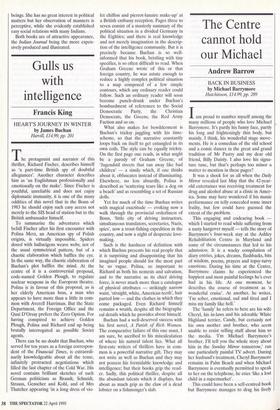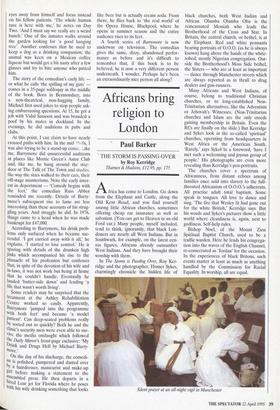The Centre cannot hold our Michael
Andrew Barrow
BACK IN BUSINESS by Michael Barrymore Hutchinson, £14.99, pp. 289 Iam proud to number myself among the many millions of people who love Michael Barrymore. It's partly his funny face, partly his long and frighteningly thin body, but mainly, I think, his wonderful stage move- ments. He is a comedian of the old school and a comic dancer in the great and grand tradition of Mr Pastry and my dear old friend, Billy Dainty. I also love his signa- ture tune, but that's perhaps too minor a matter to mention in these pages?
It was a shock for us all when the Daily Mirror revealed last May that the 42-year- old entertainer was receiving treatment for drug and alcohol abuse at a clinic in Amer- ica. Some may have wondered if his manic performance on telly concealed some inner frailty, but few could have guessed the extent of the problem.
This engaging and endearing book which I started to read while suffering from a nasty hangover myself — tells the story of Barrymore's four-week stay at the Ashley Rehabilitation Centre in Maryland and some of the circumstances that led to his admission. It is a wacky compilation of diary entries, jokes, dreams, flashbacks, bits of wisdom, poems, prayers and topsy-turvy emotions. During his time at the Centre, Barrymore claims he experienced the happiest and most painful feelings he's ever had in his life. At one moment, he describes the course of treatment as 'a wonderful cruise'. At another, he writes, `I'm sober, emotional, sad and tired and I miss my family like hell.'
The 'family' he refers to here are his wife Cheryl, his in-laws and his adorable White Highland terrier, Candy, but certainly not his own mother and brother, who seem unable to resist selling stuff about him to the media. 'I'm Michael Barrymore's brother. I'll tell you the whole story about him in the Sunday Mirror tomorrow,' ran one particularly painful TV advert. During her husband's treatment, Cheryl Barrymore remains in Palm Beach and when Michael Barrymore is eventually permitted to speak to her on the telephone, he cries 'like a lost child in a supermarket'. This could have been a self-centred book but Barrymore manages to drag his lively eyes away from himself and focus instead on his fellow patients. 'The whole human race is here with me,' he notes on Day Two. 'And I must say we really are a weird bunch.' One of the inmates walks around the garden looking for 'a good hanging tree'. Another confesses that he used to keep a dog as a drinking companion; the animal was keen on a Mexican coffee liqueur but would get a bit nasty after a few glasses and try to bite anyone who patted him.
The story of the comedian's early life or what he calls 'the spilling of my guts' comes in a 35-page soliloquy in the middle of the book. Born in Bermondsey, into a non-theatrical, non-hugging family, Michael first used jokes to stop people ask- ing embarrassing questions. At 15, he got a job with Vidal Sassoon and was branded a poof by his mates in dockland. In the evenings, he did auditions in pubs and clubs.
At this point, I can claim to have nearly crossed paths with him. In the mid 1960s, I was also trying to be a stand-up comic. Like me, Barrymore did unsuccessful auditions at places like Mortie Green's Astor Club and, like me, he hung around the stage door at The Talk of The Town and studieu the way the stars walked to their cars, their off-stage mannerisms. Note the early inter- est in deportment — 'Comedy begins with the feet,' the comedian Russ Abbot reminded me recently. Details of Barry- more's subsequent rise to fame are less interesting than these accounts of his strug- gling years. And struggle he did. In 1976, things came to a head when he was made bankrupt for £47,000.
According to Barrymore, his drink prob- lems only surfaced when he became suc- cessful. 'I got carried away with it all,' he explains. 'I started to lose control.' He is sparing with details of the drunken high Mks which accompanied his rise to the Pinnacle of his profession but confesses that, in spite of the devotion of his wife and in-laws, it was not work but being at home that he couldn't handle. Eventually he landed 'butter-side down' and leading 'a life that wasn't worth living'.
Some readers may be surprised that the treatment at the Ashley Rehabilitation Centre worked so easily. Apparently, Barrymore 'jumped into the programme with both feet' and became 'a model Patient'. Can deep-seated problems really be sorted out so quickly? Both he and the Clinic's security men were even able to sur- vive the media onslaught which followed the Daily Mirror's front-page exclusive: 'My brink and Drugs Hell by Michael Barry- On the day of his discharge, the comedi- an is polished, pampered and dusted over by a hairdresser, manicurist and make-up girl before making a statement to the assembled press. He then departs in a hired Lear jet for Florida where he poses with his wife drinking something that looks like beer but is actually cream soda. From there, he flies back to 'the real world' of the Opera House, Blackpool, where he opens in summer season and the entire audience rises to its feet.
A fourth series of Barymore is now underway on television. The comedian gives the same, dizzy, abandoned perfor- mance as before and it's difficult to remember that, if this book is to be believed, he is now a very different person underneath. I wonder. Perhaps he's been an extraordinarily nice person all along?



























































 Previous page
Previous page